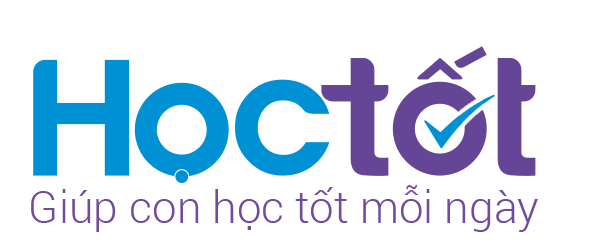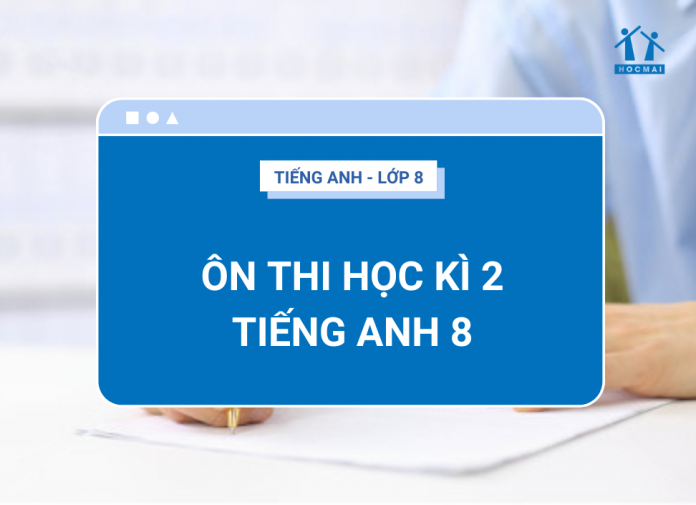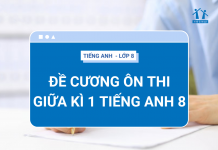Bài viết dưới đây là bài Đề cương ôn thi học kì 2 tiếng anh 8 mới nhất mà HOCMAI muốn gửi tới các em học sinh. Các em khối 8 chỉ cần tham khảo bài viết dưới đây là đã có thể an tâm tham dự kỳ thi cuối kì rồi; bởi vì kiến thức và bài tập bên dưới đây được đội ngũ giáo viên ở HOCMAI biên soạn một cách kỹ lưỡng, sát sườn so với phân phối chương trình trên lớp của các em. Các em tham khảo bài viết nhé!
A. PHẦN TỪ VỰNG – ĐỀ CƯƠNG ÔN TẬP TIẾNG ANH LỚP 8 HỌC KÌ 2
Từ vựng tiếng anh 8 Unit 10: Communication
|
Từ mới |
Phiên âm |
Định nghĩa |
| 1. body language (n) | /ˈbɒdi ˈlæŋɡwɪdʒ/ | ngôn ngữ cơ thể, hình thể, cử chỉ |
| 2. communicate (v) | /kəˈmjuːnɪkeɪt/ | giao tiếp |
| 3. communication breakdown (n) | /kəˌmjuːnɪˈkeɪʃn ˈbreɪkdaʊn/ | Sự cố giao tiếp, giao tiếp không hiểu nhau |
| 4. communication channel (n) | /kəˌmjuːnɪˈkeɪʃn ˈtʃænl/ | kênh giao tiếp |
| 5. cultural difference (n) | /ˈkʌltʃərəl ˈdɪfrəns/ | khác biệt văn hoá |
| 6. cyber world (n) | /ˈsaɪbə wɜːld/ | thế giới mạng – thế giới ảo |
| 7. chat room (n) | /tʃæt ruːm/ | phòng chat |
| 8. face-to-face (adj, ad) | /feɪs tʊ feɪs/ | trực diện, đối mặt, mặt đối mặt |
| 9. interact (v) | /ɪntərˈækt/ | tương tác |
| 10. landline phone (n) | /ˈlændlaɪn fəʊn/ | điện thoại bàn |
| 11. language barrier (n) | /ˈlæŋɡwɪdʒ ˈbæriə/ | rào cản ngôn ngữ |
| 12. message board (n) | /ˈmesɪdʒ bɔːd/ | diễn đàn trên mạng |
| 13. multimedia (n) | /ˌmʌltiˈmiːdiə/ | đa phương tiện |
| 14. netiquette (n) | /ˈnetɪket/ | phép lịch sự (khi giao tiếp trên internet) |
| 15. non-verbal language (n) | /nɒn-vɜːbl ˈlæŋɡwɪdʒ/ | ngôn ngữ không sử dụng tới lời nói |
| 16. smart phone (n) | /smɑːt fəʊn/ | điện thoại thông minh |
| 17. snail mail (n) | /sneɪl meɪl/ | thư gửi qua bưu điện |
| 18. social media (n) | /ˈsəʊʃl ˈmiːdiə/ | mạng xã hội |
| 19. verbal language (n) | /ˈvɜːbl ˈlæŋɡwɪdʒ/: | ngôn ngữ sử dụng tới lời nói |
| 20. text (n, v) | /tekst/ | văn bản, tin nhắn văn bản |
| 21. video conference (n, v) | /ˈvɪdiəʊ ˈkɒnfərəns/ | hội họp, hội thảo qua mạng có sử dụng hình ảnh |
| 22. telepathy (n) | /təˈlepəθi/ | thần giao cách cảm |
Từ vựng tiếng anh 8 Unit 11: Science and Technology
|
ENGLISH |
PRONUNCIATION |
VIETNAMESE |
| 1. archaeology (n) | /ˌɑːkiˈɒlədʒi/ | khảo cổ học |
| 2. become a reality (v) | /bɪˈkʌm ə riˈæliti/ | trở thành hiện thực |
| 3. benefit (n, v) | /ˈbenɪfɪt/ | lợi ích, hưởng lợi |
| 4. cure (v) | /kjʊə/ | chữa khỏi |
| 5. discover (v) | /dɪˈskʌvə/ | phát hiện ra |
| 6. enormous (adj) | /ɪˈnɔːməs/ | to lớn |
| 7. explore (v) | /ɪkˈsplɔː/ | khám phá, nghiên cứu |
| 8. field (n) | /fiːld/ | lĩnh vực |
| 9. improve (v) | /ɪmˈpruːv/ | Cải thiện, nâng cao |
| 10. invent (v) | /ɪnˈvent/ | phát minh ra |
| 11. light bulb (n) | /laɪt bʌlb/ | bóng đèn |
| 12. oversleep (v) | /ˌəʊvəˈsliːp/ | ngủ quên |
| 13. patent (n, v) | /ˈpætnt/ | bằng sáng chế |
| 14. precise (adj) | /prɪˈsaɪs/ | chính xác |
| 15. quality (n) | /ˈkwɒləti/ | chất lượng |
| 16. role (n) | /rəʊl/ | vai trò |
| 17. science (n) | /ˈsaɪəns/ | khoa học |
| 18. scientific (adj) | /ˌsaɪənˈtɪfɪk/ | thuộc khoa học |
| 19. solve (v) | /sɒlv/ | giải quyết |
| 20. steam engine (n) | /stiːm ˈendʒɪn/ | đầu máy hơi nước |
| 21. support (n, v) | /səˈpɔːt/ | ủng hộ |
| 22. technique (n) | /tekˈniːk/ | Kỹ thuật, thủ thuật, chuyên môn |
| 23. technical (adj) | /ˈteknɪkl/ | Thuộc về công nghệ, kỹ thuật; về mặt kỹ thuật |
| 24. technology (n) | /tekˈnɒlədʒi/ | kỹ thuật, công nghệ |
| 25. technological (adj) | /ˌteknəˈlɒdʒɪkəl/ | thuộc công nghệ, kỹ thuật |
| 26. transform (v) | /trænsˈfɔːm/ | thay đổi, biến đổi |
| 27. underground (adj, adv) | /ʌndəˈɡraʊnd/ | dưới lòng đất, ngầm, bí mật, kín |
| 28. yield (n) | /jiːld/ | sản lượng |
Từ vựng tiếng anh 8 Unit 12: Life on other planet
|
ENGLISH |
PRONUNCIATION |
VIETNAMESE |
| administration | /ədmɪnɪˈstreɪʃn/ | sự quản lý |
| aeronautic | /eərəˈnɔːtɪk/ | thuộc hàng không |
| alien | /ˈeɪliən/ | người ngoài hành tinh |
| astronaut | /ˈæstrənɔːt/ | phi hành gia |
| captain | /ˈkæptɪn/ | thuyền trưởng |
| crew | /kruː/ | thủy thủ, phi hành đoàn |
| dangerous | /ˈdeɪndʒərəs/ | nguy hiểm |
| darkness | /ˈdɑːknəs/ | bóng đêm |
| daytime | /ˈdeɪtaɪm/ | ban ngày |
| essential | /ɪˈsenʃl/ | Thiết yếu, cần thiết |
| existence | /ɪɡˈzɪstəns/ | sự tồn tại |
| exploration | /ekspləˈreɪʃn/ | sự khám phá |
| far-sighted | /fɑːr-saɪtɪd/ | viễn thị |
| galaxy | /ˈɡæləksi/ | dải Ngân hà |
| grassy area | /ˈɡrɑːsi ˈeəriə/ | vùng nhiều cỏ |
| helicopter | /ˈhelɪkɒptər/ | máy bay trực thăng |
| human being | /ˈhjuːmənˈbiːɪŋ/ | con người |
| human life | /ˈhjuːmən laɪf/ | cuộc sống loài người |
| illness | /ˈɪlnəs/ | bệnh tật |
| imaginary | /ɪˈmædʒɪnəri/ | tưởng tượng, hư không, hoang tưởng |
| incident | /ˈɪnsɪdənt/ | Sự cố |
| incredible | /ɪnˈkredɪbl/ | không thể tin được |
| inhabitant | /ɪnˈhæbɪtənt/ | cư dân |
| journey | /ˈdʒɜːni/ | hành trình |
| Jupiter | /ˈdʒuːpɪtər/ | Sao Mộc |
| lack of | /læk əv/ | thiếu |
| land | /lænd/ | đất, vùng đất |
| launch | /lɔːntʃ/ | phóng lên |
| lightning | /ˈlaɪtnɪŋ/ | tia chớp |
| machine | /məˈʃiːn/ | máy móc |
| Mars | /mɑːz/ | Sao Hỏa |
| Mercury | /ˈmɜːkjʊri/ | Sao Thủy |
| name after | /neɪm ˈɑːftər/ | đặt tên theo |
| Neptune | /ˈneptjuːn/ | Sao Hải Vương |
| notable | /ˈnəʊtəbl/ | Có tiếng; đáng chú ý |
| outer space | /ˈaʊtər speɪs/ | ngoại tầng không gian |
| oxygen tank | /ˈɒksɪdʒən tæŋk/ | Bình dưỡng khí oxy |
| particular | /pəˈtɪkjələr/ | đặc trưng |
| planet | /ˈplænɪt/ | hành tinh |
| reddish | /ˈredɪʃ/ | hơi đỏ |
| Roman god | /ˈrəʊmən gɒd/ | vị thần La Mã |
| Saturn | /ˈsætən/ | Sao Thổ |
| shiny | /ˈʃaɪni/ | sáng bóng |
| similarity | /sɪməˈlærəti/ | sự giống nhau |
| solar system | /ˈsəʊlər ˈsɪstəm/ | Hệ Mặt Trời |
| space buggy | /speɪs ˈbʌɡi/ | xe đi trên hành tinh khác (sao hỏa, mặt trăng) |
| step onto the Moon | /step ˈɒntu ðə muːn/ | đặt chân lên Mặt Trăng |
| terrorist | /ˈterərɪst/ | tên khủng bố |
| thunder | /ˈθʌndər/ | sấm |
| UFO | /ˌjuː ef ˈəʊ/ | vật thể bay không xác định |
| unimportant | /ʌnɪmˈpɔːtənt/ | không quan trọng |
| unsuitable | /ʌnˈsuːtəbəl/ | không thích hợp |
| Venus | /ˈviːnəs/ | Sao Kim |
| waterless | /ˈwɔːtəlcs/ | không có nước |
| weather condition | /ˈweðər kənˈdɪʃən/ | điều kiện thời tiết |
| weightless | /ˈweɪtləs/ | không trọng lượng |
| witness | /ˈwɪtnəs/ | nhân chứng |
 TOPCLASS 2024 - CHƯƠNG TRÌNH HỌC TOÀN DIỆN
NẮM CHẮC KIẾN THỨC - BỨT PHÁ ĐIỂM SỐ
TOPCLASS 2024 - CHƯƠNG TRÌNH HỌC TOÀN DIỆN
NẮM CHẮC KIẾN THỨC - BỨT PHÁ ĐIỂM SỐ
%22%3E%20%3Cpath%20d%3D%22M685%201299l614-614q19-19%2019-45t-19-45l-102-102q-19-19-45-19t-45%2019L640%20960%20429%20749q-19-19-45-19t-45%2019L237%20851q-19%2019-19%2045t19%2045l358%20358q19%2019%2045%2019t45-19zm851-883v960q0%20119-84.5%20203.5T1248%201664H288q-119%200-203.5-84.5T0%201376V416q0-119%2084.5-203.5T288%20128h960q119%200%20203.5%2084.5T1536%20416z%22%3E%3C%2Fpath%3E%20%3C%2Fsvg%3E) Chu trình học tập khép kín HỌC - LUYỆN - HỎI - KIỂM TRA
Chu trình học tập khép kín HỌC - LUYỆN - HỎI - KIỂM TRA%22%3E%20%3Cpath%20d%3D%22M685%201299l614-614q19-19%2019-45t-19-45l-102-102q-19-19-45-19t-45%2019L640%20960%20429%20749q-19-19-45-19t-45%2019L237%20851q-19%2019-19%2045t19%2045l358%20358q19%2019%2045%2019t45-19zm851-883v960q0%20119-84.5%20203.5T1248%201664H288q-119%200-203.5-84.5T0%201376V416q0-119%2084.5-203.5T288%20128h960q119%200%20203.5%2084.5T1536%20416z%22%3E%3C%2Fpath%3E%20%3C%2Fsvg%3E) Đa dạng hình thức học - Phù hợp với mọi nhu cầu
Đa dạng hình thức học - Phù hợp với mọi nhu cầu%22%3E%20%3Cpath%20d%3D%22M685%201299l614-614q19-19%2019-45t-19-45l-102-102q-19-19-45-19t-45%2019L640%20960%20429%20749q-19-19-45-19t-45%2019L237%20851q-19%2019-19%2045t19%2045l358%20358q19%2019%2045%2019t45-19zm851-883v960q0%20119-84.5%20203.5T1248%201664H288q-119%200-203.5-84.5T0%201376V416q0-119%2084.5-203.5T288%20128h960q119%200%20203.5%2084.5T1536%20416z%22%3E%3C%2Fpath%3E%20%3C%2Fsvg%3E) Đội ngũ giáo viên giảng dạy nổi tiếng với 16+ năm kinh nghiệm
Đội ngũ giáo viên giảng dạy nổi tiếng với 16+ năm kinh nghiệm%22%3E%20%3Cpath%20d%3D%22M685%201299l614-614q19-19%2019-45t-19-45l-102-102q-19-19-45-19t-45%2019L640%20960%20429%20749q-19-19-45-19t-45%2019L237%20851q-19%2019-19%2045t19%2045l358%20358q19%2019%2045%2019t45-19zm851-883v960q0%20119-84.5%20203.5T1248%201664H288q-119%200-203.5-84.5T0%201376V416q0-119%2084.5-203.5T288%20128h960q119%200%20203.5%2084.5T1536%20416z%22%3E%3C%2Fpath%3E%20%3C%2Fsvg%3E) Dịch vụ hỗ trợ học tập đồng hành xuyên suốt quá trình học tập
Dịch vụ hỗ trợ học tập đồng hành xuyên suốt quá trình học tập
 Ưu đãi đặt chỗ sớm - Giảm đến 45%! Áp dụng cho PHHS đăng ký trong tháng này!
Ưu đãi đặt chỗ sớm - Giảm đến 45%! Áp dụng cho PHHS đăng ký trong tháng này!
Chu trình học tập khép kín HỌC - LUYỆN - HỎI - KIỂM TRA
Đa dạng hình thức học - Phù hợp với mọi nhu cầu
Đội ngũ giáo viên giảng dạy nổi tiếng với 16+ năm kinh nghiệm
Dịch vụ hỗ trợ học tập đồng hành xuyên suốt quá trình học tập
B. PHẦN NGỮ PHÁP – ĐỀ CƯƠNG ÔN TẬP KÌ 2 TIẾNG ANH 8
Ngữ pháp tiếng anh lớp 8 Unit 10: Communication
I. THÌ TƯƠNG LAI TIẾP DIỄN
1) STRUCTURE
(Khẳng định) S – Will be V-ing – O
we/ they/ I/ you/ she/ it/ he + will be V-ing.
(Phủ định) S – won’t/will not be V-ing – O
we/ they/ I/ you/ she/ it/ he + won’t/will not be V-ing.
(Nghi vấn) Will – S – be V-ing – O?
Will we/ they/ I/ you/ she/ it/ he+ be V-ing?
NOTE: có thể thay từ “will” bằng từ “shall” trong trường hợp chủ ngữ là I, we.
2) USAGE
– Sử dụng thì Tương lai tiếp diễn để diễn tả sự việc sẽ đang xảy ra trong một thời điểm xác định ở trong tương lai.
Eg: You will be having a speech at this time this Saturday.
3) ADVERBS
- At this time + mốc tương lai: bằng giờ…
- At that time
- When + S + V (hiện tại)
II. NHỮNG ĐỘNG TỪ THEO SAU LÀ TO-V VÀ V-ING
Bảng bên dưới đây sẽ phân biệt vị trí của những động từ nguyên mẫu có danh động từ (V-ing) và to (to-V).
|
To V |
V-ing |
| Cả hai đều có thể làm thành phần chủ ngữ ở trong câu, theo sau đó là một động từ số ít.
To-V thì thường chỉ mục đích. Eg: Learning Spanish is so fun. To get up early everyday, I definitely never stay up late. |
|
| Cả hai đều đi phía sau động từ tobe “is”.
Eg: My hobby is collecting papers. His duty is to safeguard the Ho Chi Minh mausoleum. |
|
| To V theo sau những động từ cụ thể sau:
Agree (đồng tình) Seem (dường như) Arrange (sắp đặt) Ask (hỏi) Decide (quyết định) Advise (khuyên) Allow (cho phép) Want (muốn) Enable (làm cho có thể) Encourage (khuyến khích) Forbid (cấm) Force (bắt ép) Instruct (hướng dẫn) … eg: I really want to buy this furniture. |
V-ing theo sau những động từ cụ thể sau:
Admit (thừa nhận) Avoid (tránh) Consider (coi như) Delay (hoãn) Deny (phủ nhận) Detest/ hate (ghét) Dread (sợ) Enjoy (thích thú) Fancy (thích) Imagine (tưởng tượng) Finish (kết thúc) Keep (cứ duy trì) … eg: Alexander denied stealing Phu’s bag. |
| To V làm tân ngữ cho tính từ.
eg: It’s time-consuming to read your CV. |
V-ing làm tân ngữ cho giới từ.
eg: All of my ex-boyfriends are keen on singing. |
Ngữ pháp tiếng anh lớp 8 Unit 11: Science and Technology
I. CÂU TƯỜNG THUẬT (dạng câu trần thuật)
1) Những bước chuyển từ lời nói trực tiếp sang nói gián tiếp
1.1) Đổi chủ ngữ, tân ngữ
|
Lời nói trực tiếp |
Lời nói gián tiếp |
|
| Đại từ nhân xưng | I | He/ she |
| We | They | |
| You | I/ we, he, she | |
| Tính từ sở hữu | My | His/ her |
| Our | Their | |
| Your | My | |
| Đại từ sở hữu | Mine | His/ hers |
| Ours | Their | |
| Yours | Mine | |
| Đại từ tân ngữ | Me | Him/ her |
| Us | Them | |
| You | Me/ him/ her |
1.2) Chuyển thời động từ:
Thông thường, ta chỉ thực hiện lùi thì khi có động từ giới thiệu như tell, say, ask, etc. chia ở thì quá khứ đơn. Không lùi thì khi những động từ trên được chia ở thời hiện tại đơn.
Quy tắc lùi thì được tóm gọn ở trong bảng sau:
|
Lời nói trực tiếp |
Lời nói gián tiếp |
| Hiện tại đơn – (S + Vs/es) | Quá khứ đơn – (S + Ved) |
| Hiện tại tiếp diễn – (S + are/is/am + Ving) | Quá khứ tiếp diễn – (S + were/was + Ving) |
| Hiện tại hoàn thành – (S + have/has + PII) | Quá khứ hoàn thành – (S + had + P2) |
| Quá khứ đơn – (S + Ved) | Quá khứ hoàn thành – (S + had + P2) |
| Quá khứ tiếp diễn – (S + were/was + Ving) | Quá khứ hoàn thành tiếp diễn – (S + had been + Ving) |
| Quá khứ hoàn thành – (S + had + P2) | Giữ nguyên |
| Tương lai đơn – (S + will + V) | S + would V |
| Tương lai gần – (S + am/ is/ are + going to V) | Were/was + going to V |
| Must | Had to |
| Can | Could |
| May | Might |
| Câu điều kiện loại I | Câu điều kiện loại II |
1.3) Trạng từ để chỉ nơi chốn, thời gian
| Trực tiếp | Gián tiếp |
| Tomorrow | The following day hoặc the next day |
| Yesterday | The previous day hoặc the day before |
| Last + danh từ chỉ thời gian | The previous + danh từ chỉ thời gian |
| The + danh từ chỉ thời gian + before | |
| Next + danh từ chỉ thời gian | The following + danh từ chỉ thời gian |
| The next + danh từ chỉ thời gian | |
| This | That |
| These | Those |
| Here | There |
| Now | Then |
| Today | That day |
| Ago | Before |
2) Cách để chuyển sang câu gián tiếp với từng thể loại câu cụ thể
Với kiểu câu trần thuật, ta chỉ cần phải viết lại động từ giới thiệu, sau đó chuyển đổi thành phần chủ ngữ, lùi thì của động từ chính, và sau đó thay đổi trạng ngữ (nếu có) theo bảng đã nêu ở bên trên.
CẤU TRÚC:
“S1 + V”, S2 said.
⇒ S2 + told sb/ said to sb/ complained to sb/ explained to sb/ thought/ believed/announced + that S1 + V (lùi thì)
eg:
“We are having an important conversation here now.” the secretary told me.
⇒ The secretary told me that they were having an important conversation there then.
Ngữ pháp tiếng anh lớp 8 Unit 12: Life on other planets
I. CÂU TƯỜNG THUẬT (dạng nghi vấn)
1) Yes/ no question
Vì bản chất của loại câu gián tiếp là thuật lại lời nói nên ta chuyển đổi câu nghi vấn về với dạng khẳng định bằng cách bỏ trợ động từ (auxiliary) và dấu hỏi chấm.
Tiếp đó, ta lùi thì của động từ chính theo chuẩn quy tắc. Sau đó thực hiện bước chuyển đổi như đối với câu trần thuật.
CHÚ Ý: Ta không sử dụng that ở trong câu nghi vấn. Thay vào đó, whether/ if được phép sử dụng.
CẤU TRÚC:
“Auxiliary + S1 + V?”, S2 said/ wondered/ asked/ wanted to know.
⇒ S2 + said/ wondered/ asked/ wanted to know + whether/ if + S1 + V (lùi thì)
eg:
Tiffany asked her professor: “Do we have to hand in this assignment this Friday?”
Tiffany asked her professor if they had to hand in this assignment that Friday.
2) Câu hỏi thông tin wh-questions:
CẤU TRÚC:
“WH-questions + auxiliary + S1 + V?” S2 said/ wondered/ asked/ wanted to know.
⇒ S2 said/ wondered/ asked/ wanted to know + WH-ques + S1 + V (lùi thì).
eg:
Mr. Songoku said to me, “Why did you go with my brother last weekend?”
Mr. Songoku asked me why I had gone with his brother the weekend before.
C. BÀI TẬP ÔN THI TIẾNG ANH 8 KÌ 2 (TRẮC NGHIỆM)
Exercise 1: Choose the letter A, B, C or D to complete the sentences
Question 1: I prefer a face-to-face meeting __________ video call.
A) to B) on
C) of D) with
Question 2: There is no school or education center teaching netiquette __________ we definitely should learn it.
A) or B) so
C) but D) because
Question 3: Non-verbal __________ is popular in people’s daily life.
A) communicate B. communication
C) communicative D. communicating
Question 4: With multimedia, we can have __________easily to the latest news all over the world.
A) access B)message
C) language C)landline
Question 5: Has she ever talked with strangers in a chat __________?
A) house B. room
C) area D. neighbor
Question 6: You should not believe in such things in the __________ world.
A) real B) cultural
C) body C) cyber
Question 7: Communication __________ happens when two people (or more) don’t understand the content of what each other is talking about.
A) breakout B) breakdown
C) breakin D) breakoff
Question 8: Could you please tell me how many __________ channels are there in our daily life?
A) communication B. world
C) conference D. difference
Question 9: Archaeologists are digging the ground to __________ old mysteries.
A) explore B) patent
C) invent D) support
Question 10: I really hope my dream will come __________ in the near future.
A) true B) truth
C) reality D) realistic
Question 11: I want to go to the grocery store to buy three__________ bulbs.
A. precise B. field
C. light D. steam
Question 12: We are trying to __________ the big problem with the steam engine before midnight.
A) support B) solve
C) invent D) benefit
Question 13: There are a lot of advantages for us to do __________ researches.
A) scientific B)enormous
C) precise D)technical
Question 14: This water is __________ poisonous that indigenous people here can’t take in.
A) too B) so
C) enough D)such
Question 15: I love __________ at pictures of the universe, galaxy, planets very much.
A) seeing B)watching
C) looking D)viewing
Question 16: Space __________ is the main vehicle available for astronauts to travel around on the Moon.
A) buggy B. system
C) surface D. planet
Question 17: I’m really curious about the __________ space of our Earth.
A) alien B) weightless
C) outer D) poisonous
Question 18: The atmosphere on Mars has quite the same condition __________ that on Earth.
A) than B) on
C) at D) with
Question 19: Have you guys ever seen a flying __________?
A) danger B) saucer
C) outer D) painter
Question 20: Neil Armstrong is known as the first person __________ on the Moon.
A) step B) steps
C) stepping D) to step
Đáp án (Answer):
| 1.A | 2.C | 3.B | 4.A | 5.B | 6.D | 7.B | 8.A | 9.A | 10.A |
| 11.C | 12.B | 13.A | 14.B | 15.C | 16.A | 17.C | 18.A | 19.B | 20.D |
Exercise 2: Rewrite sentences without changing the meaning
Question 1: Peterson said: “I will try to train hard to pass this physical entrance exam.”
A) Peterson said that he would try to train hard to pass this physical entrance exam.
B) Peterson told me that he would try to train hard to pass this physical entrance exam.
C) Peterson asked that he would try to train hard to pass this physical entrance exam.
D) Peterson talked to me that he would try to train hard to pass this physical entrance exam.
Question 2: It’s fascinating to watch romantic and touching movies.
A) Watch romantic and touching movies is fascinating.
B) Watching romantic and touching movies is fascinating.
C) To watch romantic and touching movies is fascinating.
D) Watching romantic and touching movies is boring.
Question 3: Thanks to some technological advances, people are having a more convenient life.
A) People’s life would be more convenient if there were no technological advances.
B) People’s life would be less convenient if there were no technological advances.
C) People’s life would be more expensive if there were no technological advances.
D) People’s life would be less expensive if there were no technological advances.
Question 4: I haven’t been to this exhibition room before.
A) I don’t like going to exhibition rooms.
B) This exhibition room is attractive.
C) Before going to this one, I didn’t go to any other exhibition room.
D) This is the first time I have gone to this exhibition room.
Question 5: My smart phone is so multi-functional that I bring it everywhere.
A) It is such a multi-functional smart phone that I bring it everywhere.
B) I bring my smart phone everywhere although it’s multi-functional.
C) My smart phone is not multi-functional enough for me to bring.
D) My smart phone is multi-functional so that I can’t bring it anywhere.
Đáp án (Answer):
| 1.A | 2.B | 3.B | 4.D | 5.A |
Exercise 3: Choose the letter A, B, C or D to answer these following questions
A new study published on VTD channel shows definitive evidence of organic matter found on the surface of Mars. The data was captured by NASA’s nuclear-powered Curiosity rover. It confirms previous findings that Mars, the Red Planet once contained carbon-based compounds. These compounds – also known as organic molecules – are essential ingredients for life as scientists understand them.
Organic molecules were found in Mars’ Gale crater, a large area that may have been a lake more than three billion years ago. The rover found traces of the molecule in rocks quarried from this area. The rock also contains sulfur, which scientists speculate helped preserve organic matter even when the rock was exposed to harsh radiation on the planet’s surface.
Scientists were quick to state that the presence of these organic molecules was not sufficient evidence of ancient life on Mars, as the molecules could have been formed by non-existent processes. there is life. But it remains one of the most astonishing discoveries, which could lead to future discoveries. Especially considering the other startling discovery that Curiosity made about 5 years ago.
Question 1: Did Mars contain carbon-based compounds?
A) Yes, it did
B) no, it didn’t
Question 2: What may have been in Mars’s Gale Crater?
A) a mountain B)a forest
C) a lake D) a hill
Question 3: What was the role of the sulfur in the rocks?
A) It helped preserve the organics
B) It formed the rocks
C) It made the atmosphere
D) It made life possible
Question 4: Have there been enough evidences to confirm the existence of life on Mars?
A.)Yes, there have
B) No, there haven’t
Question 5: Why are the evidences in sufficient to claim life on Mars?
A) The molecules could have been formed by non-living processes.
B) The molecules exist everywhere on the planet.
C) All planets have these molecules.
D) The existence of these molecules is not strong enough.
Đáp án (Answer):
| 1.A | 2.C | 3.A | 4.B | 5.A |
D. ĐỀ THI TIẾNG ANH LỚP 8 HỌC KÌ 2 (CÓ ĐÁP ÁN)
Bài viết tham khảo thêm:
Bài viết Đề cương Ôn thi học kì 2 tiếng anh 8 mới nhất đến đây là kết thúc. Các em học sinh khối 8 hãy ôn luyện chăm chỉ, cần cù để đạt được kết quả xứng đáng với bản thân nhé. HOCMAI chúc các em có một mùa thi thật may mắn nhé!


















